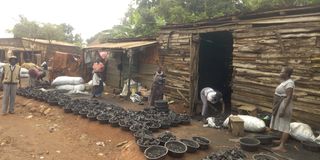Traders hike charcoal prices

Charcoal traders at Sofia market, Busia Town on Sunday. PHOTO/DAVID AWORI
What you need to know:
Busia dealers cite effects of the presidential order against the trade
Charcoal traders and consumers in Busia Town are feeling the brunt of President Museveni’s directive on banning charcoal burning in parts of the country.
Last month, Mr Museveni issued a raft of directives contained in an Executive Order, which, among others, banned charcoal burning in Northern and Northeastern Uganda in order to protect the environment, especially Shea butter trees from depletion.
At Sofia Market, known for selling wood fuel in Busia District, a sack of charcoal costs Shs75,000 up from Shs50,000 three weeks ago.
Mr James Otuke, one of the charcoal traders, attributed the skyrocketing prices to a shortage in supply from the charcoal-producing areas of Lango, Acholi, and West Nile and Karamoja sub-regions.
“Following the Presidential directive, we have experienced a total reduction in the number of trucks that deliver charcoal to this market, which has led to scarcity and increase in prices,” Mr Otuke said on Sunday.
He said more than 500 trucks would deliver charcoal to the over 20 stores at Sofia Market weekly.
Mr Otuke, however, said no truck has delivered charcoal to the market in the last two weeks.
At the weekend, our reporter found more than 15 empty stores while the women and young men, who have been eking out a living from this once-lucrative business, were found either playing cards or sleeping.
Mr Otuke says he risks losing Shs20m which he borrowed from one of the banks and paid to charcoal burners in Kitgum District before the President made the directive.
Ms Florence Handeke, who has been in the charcoal business for the past four years, said she invested close to Shs5m to have charcoal delivered from Karamoja, but she had not received a single sack by Sunday night.
Mr Hussein Muwara, a money changer in Sofia Market, whose business partly depends on the charcoal business, said many traders who had gone to buy charcoal in Northern Uganda had returned a few weeks ago claiming that they had suffered at the hands of former Aruu Member of Parliament, Mr Odonga Otto.
Mr Otto in February launched a controversial approach to implement the charcoal ban in the region using local vigilantes under Ribbe Pi Paco (RPP), an environmental youth advocacy and activism group.
The group stormed several charcoal hotspots in the region where they destroyed logs and charcoal and also intercepted trucks loaded with charcoal on the major highways.
“ The skyrocketing prices have affected domestic and commercial consumers such as restaurants in Busia Town.
Ms Sarah Hadeti, who operates a food kiosk in Arubaine Village, said: “Previously, I have been spending Shs7,000 daily on charcoal, but since May, I have been spending Shs20,000 per day. We are hardly making any profits because of the high cost of charcoal.”
“Whereas the policy to ban charcoal trade from its producing areas was good, the President needed to have looked into the alternatives first,” Mr Moses Okello, a district councillor representing Sikuda Sub-county said.
“Majority of our people use wood fuel for cooking because of high costs of electricity and gas cylinders,” Mr Okello said.
He urged the President to expedite the reduction of power tariffs and make gas available and cheaper.




